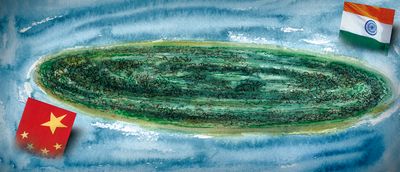The Maldives situation presents a profound dilemma for the Modi government, but it can also be turned around as a rare opportunity to engage with China. To the core constituency of the Modi government, the Maldives becomes a test case of ‘muscular diplomacy’. But, an Indian intervention to bring about regime change in the Maldives will constitute a blatant violation of international law and the UN Charter, and is fraught with risks and unforeseen consequences.
The good thing is that India has a new foreign secretary and Vijay Gokhale is an authentic ‘China hand’ with credentials to conduct a rational conversation with Beijing. China’s stance on the Maldives has five key templates. One, China regards the situation strictly as that country’s internal affair, which should be resolved through dialogue and negotiation by the parties who have the wisdom and capabilities to cope with the current situation independently.
Two, the international community should respect the Maldives’ sovereignty and territorial integrity, and any interference may complicate the situation. Three, China’s cooperation with the Maldives focuses on economic ties, and Beijing has no intentions to impair that country’s sovereignty and independence or undermine the security of the Indian Ocean region. Four, China will not interfere in the Maldives, albeit supporting Male government in resolving differences with relevant parties as well as upholding the independence, sovereignty, and legitimate rights and interests of the nation. Finally, and importantly, Beijing exhorts the international community to play a constructive role by extending assistance and convenience for the Maldivian sides to hold talks.
Clearly, a unilateral Indian intervention in the Maldives on whatever pretext, in the absence of a mandate from the United Nations or invitation by the established government in Male, would almost certainly meet with Chinese opposition. On the other hand, what emerges could be sufficient common ground for Delhi and Beijing to have strategic communication. Indeed, if China has no intentions of creating new facts on the ground impacting the security of the Indian Ocean region, India’s core concerns and vital interests are not in jeopardy.
However, the real problem lies elsewhere. The subversion of democracy in the Maldives really began in 2013 when the Barack Obama administration sought to secretly negotiate a Status Of Forces Agreement (SOFA) with Male leading to the establishment of an American air base. But the November 2013 elections brought in a new leadership in Male that didn’t pursue the SOFA negotiations. During the past three-year period, given the injection of Sinophobia into the Modi government’s foreign policy narrative, Delhi and Washington began coordinating their approaches vis-à-vis the geopolitics of the Maldives. This is where India needs to reassess where its self-interests lie. The narrative that China is on a ‘land grab’ in our neighborhood has been a convenient alibi for sections of the establishment to align Indian policies with the US’s regional strategies. Whereas, the tenacity of small countries such as the Maldives (or Sri Lanka and Nepal) to safeguard their independence should never have been in any serious doubt.
Modi finds himself grappling with a paradigm strikingly similar to what Atal Bihari Vajpayee encountered in 2003 when the US was assembling a ‘coalition of the willing’ to invade Iraq and sought Indian participation in that enterprise. In generic terms, the neocons in the Indian establishment, interest groups and lobbyists, who argued for an army contingent to be dispatched to Iraq 15 years ago, seem to be once again rooting for intervention in the Maldives. Of course, Vajpayee viewed the paradigm exclusively through the prism of national interest and that wise decision made all the difference. It is Modi’s call now.
editor@theweek.in


